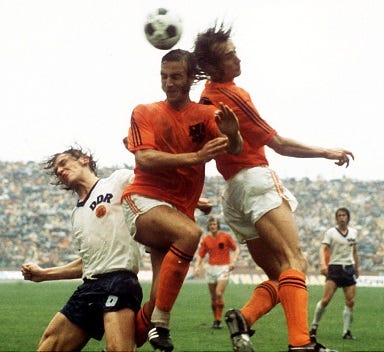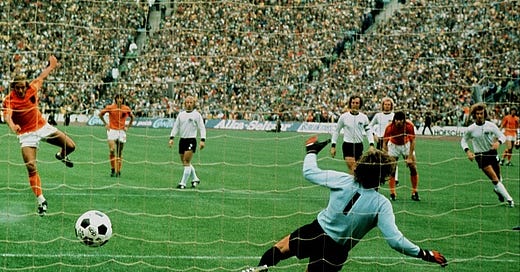Never Mind Rodri... here's Johan the Second
Sometimes a No.6 can be the No.1. But usually the guy behind the guy has to be content with a supporting role. And nobody did it better than Neeskens
Rodri's surprise win at the Ballon d'Or ceremony last week reminded us of a more straightforward time in football. It wasn't just the identity of France Football's choice for the award – a Manchester City midfielder instead of Vinicius Jr, the golden boy from Real Madrid – that caused eyebrows to raise and brows to furrow, but also the type of player the judges had ultimately voted for. In the history of the Ballon d'Or, defensive midfielders have rarely ever been that guy.
Trawl through the list of winners and only the Dukla Prague midfielder Josef Masopust strikes you as someone who might be considered Rodri's early-day equivalent, but even the Czech had moved to centre-half by the time he reached the World Cup final in 1962 and subsequently won that year's award, ahead of Eusebio in second place.
Rodri's triumph this year was underscored by his brilliant performances for Spain in winning Euro 2024 but also for his role in City's fourth successive Premier League title. It would be unfair to call him a system player; he is less flashy than Vinicius but every bit as transformative as the Brazilian – just in a different way.
Real Madrid's subsequent PR meltdown only served to reinforce the idea that somehow European football's worm had turned. Here was the establishment club, footballing royalty, throwing a despot-like hissy fit because their man had been overlooked.
That self-entitlement brought to mind a footballer I'd once met. Not because he was arrogant but because he was the counterpoint to that kind of privileged thinking. Like Rodri, he had been an integral part of his teams, transformative and epoch-defining but in a way that did not muster the same kind of accolades as others and, as such, he was rarely in the conversation for the Ballon d'Or. He was no shrinking violet either, but he was comfortable with his place in the grand scheme of things.
It's late 2019 and we're standing in a sports hall in Doha's Oxygen Park district, one of those bland, futuristic social hubs that pass for neighbourhoods in the Emirates. Throngs of young people – some children and others in their teens – move about the hall in desultory fashion, there are a few small-sided football games playing out around us and then a sharp peep of a whistle brings them to a halt. Soon there is a compere standing at the back of the hall beside a mini stage. He's asking the children if they know who the man standing beside him is, pointing to a wiry gent in navy polo shirt and blue jeans.
The stranger is older but he has a healthy, tanned complexion and a full head of hair in a style that looks as if it was one he was happy to settle on many years ago. To an air of relative detachment and polite applause from the kids, the compere announces that this man scored in a World Cup final.
Standing here before us is one of the greats of the modern game: Johan Neeskens. I'm in the company of Hugh MacDonald, the best Scottish sportswriter of this era, a man who has interviewed some of football's biggest names, and even he is visibly animated at the chance to speak to Neeskens.
And rightly so. Neeskens was the heartbeat to Johan Cruyff's brain in the great Ajax team of the 1970s – and the fulcrum of the Dutch side that reached back-to-back World Cup finals in 1974 and 1978. This is no casual rewriting of history either: his importance was certainly not lost on Cruyff, who persuaded Barcelona to pay big money for his team-mate in the months after the '74 World Cup.
The gathered journalists, here as part of the Qatari government's charm offensive ahead of the 2022 World Cup finals, know exactly who Neeskens is. They might also have given the public address announcer some information of their own: the man standing before them was the product of a broken marriage; he had slept in a corridor when he was growing up; he was eventually jettisoned by Barca for refusing to pass a toilet roll under the cubicle he was in to the club president Josep Lluís Núñez. In later life, he sought help to combat his addictions to alcohol, cocaine and gambling – a rock-star lifestyle for the footballer with the glam-rock good looks, flowing locks and massive sideburns. Yet, he was simultaneously the quiet man of the sides he represented, known as the Silent One – somewhat incongruously given his demonic on-pitch style in which he cared little for personal safety (his or that of others). There is little documented evidence of his life outside of football, no autobiography – and the nickname is entirely in keeping with his status as an enigma.
On this day, though, Neeskens makes for good copy. As an older man, he is a garrulous subject – perhaps because he is on solid ground as he is asked to dissect the differences between football now and then; here in this sports hall in Qatar he rails against what the game has become.
“Everything has changed and not always for the benefit of football,” he says wistfully. “Football is dominated by money and the teams with money have much more opportunity to succeed. But I think you cannot change this.”
The irony, of course, is that Neeskens was very much ahead of his era. He is the identikit of the modern midfielder in today's game.
Without the energetic midfielder's pressing, his self-sacrifice and willingness to put his body on the line, Cruyff would not have been nearly as successful and so Neeskens' lot was to play the role of the indispensable yin to Cruyff sublime's yang. How to separate the two? There is no simple answer, not least when Neeskens was capable of great beauty himself on the football pitch.
His curse was to be great – just not the greatest.

Scroll through the list of Ballon d'Or winners (and even those coming in second and third place) and you will not find his name. Cruyff is there three times. Most of the others – including Di Stefano, Eusebio, Best, Charlton and Law – are there, too. But many are missing.
Some of those who did not win the accolade – the European Footballer of the Year in old money - might shock you. Ferenc Puskas missed out to Luis Suarez (the OG) in 1960; Kenny Dalglish trailed Michel Platini by almost 100 votes in 1983. Diego Maradona's name is absent from the roll of honour by dint of the fact that the award was not open to players who were not European until 1995.
The closest Neeskens came was a fifth-placed finish in 1974 ahead of Gregorz Lato and Gerd Muller but behind Kazimierz Deyna, Paul Breitner and Franz Beckenbauer in a year when, naturally, Cruyff was the winner. But on that day in Qatar, he put the argument about good, better and best in its proper context.
“For me, sometimes they will say 'who was the best of all time?' I don't think you can say that because football is changing so much but you have decades when maybe you will say 'okay, he was the best player'. The 60s for me, it was Pele. In the 70s, it was Johan Cruyff. In the 80s, you get Maradona and you go on. Then, lately, it was Ronaldo and Messi. And, of course, there comes a time when two or three other players are going to take over and we shall see. But, to say one was better than the other . . . no, because football cannot compare the 60s and 70s with 2020. Impossible. Everything in football changed.”
It was a typically forthright Neeskens response, but one grounded in realism. After all, he was named as one of FIFA's 100 greatest living footballers in 2004, a list that would look markedly different were it to be compiled today given that Neeskens and Pele, the man who it is said compiled it, are no longer with us.
But in any case, Neeskens already knew his place and he was quite happy with where he sat in the pecking order. It was, after all, a lofty perch. His nickname amongst Barca fans was Johan Segon (Johan the Second). When he was continually asked about what it was like living in the shadow of Cruyff, Neeskens picked up the baton and ran with it, smirking: “I don’t mind being the second greatest player in the world”.






